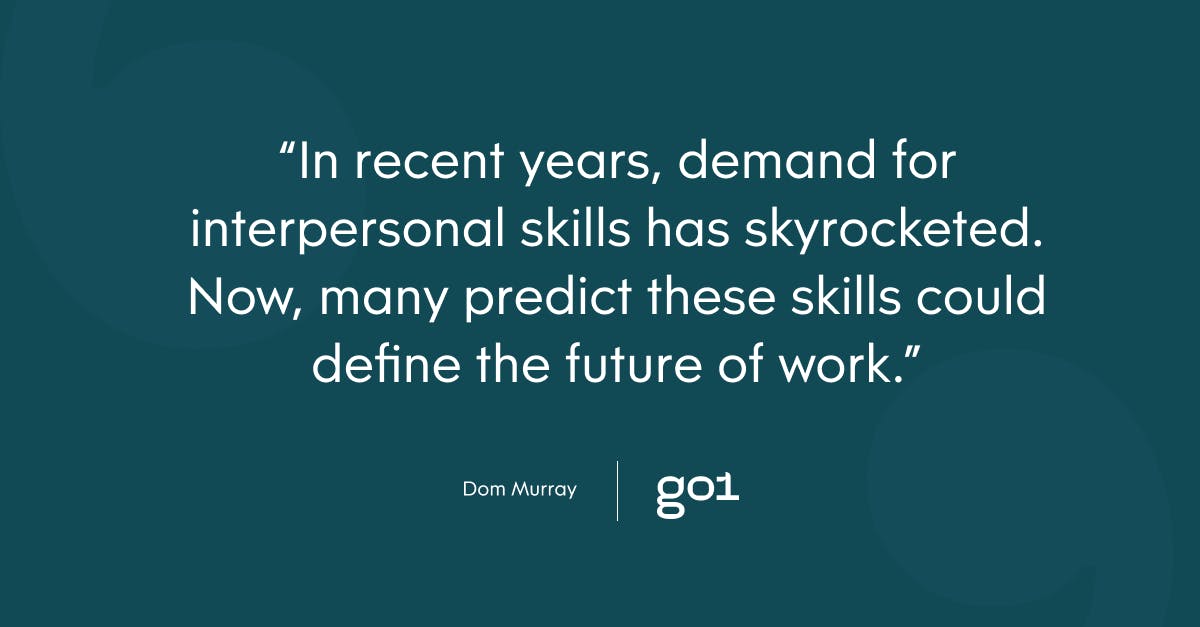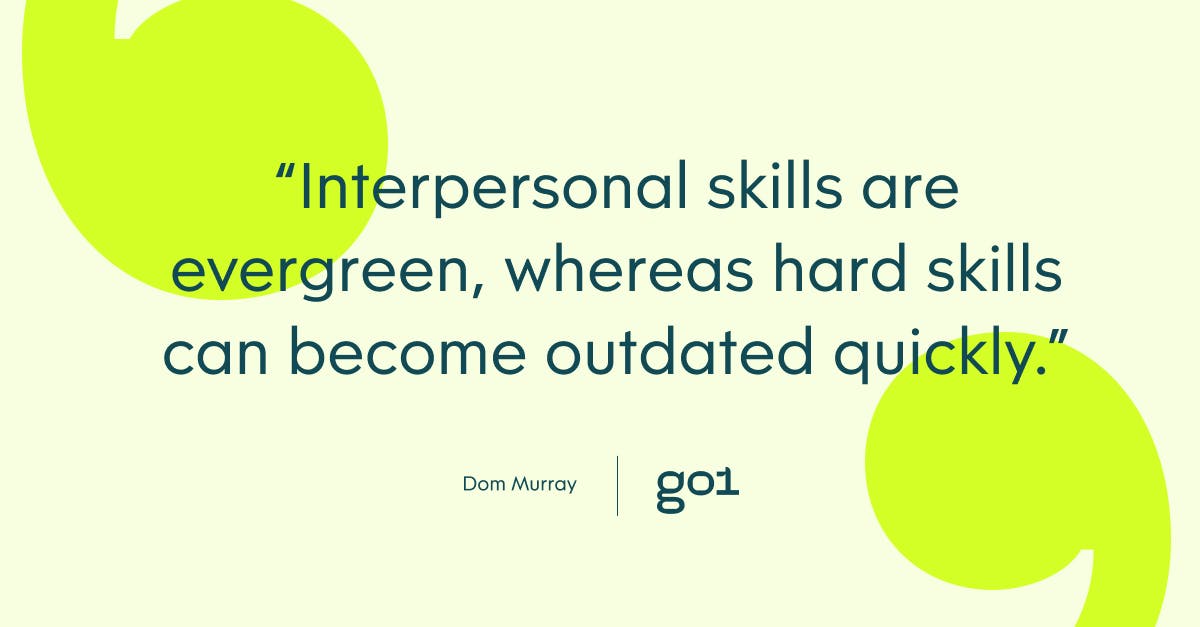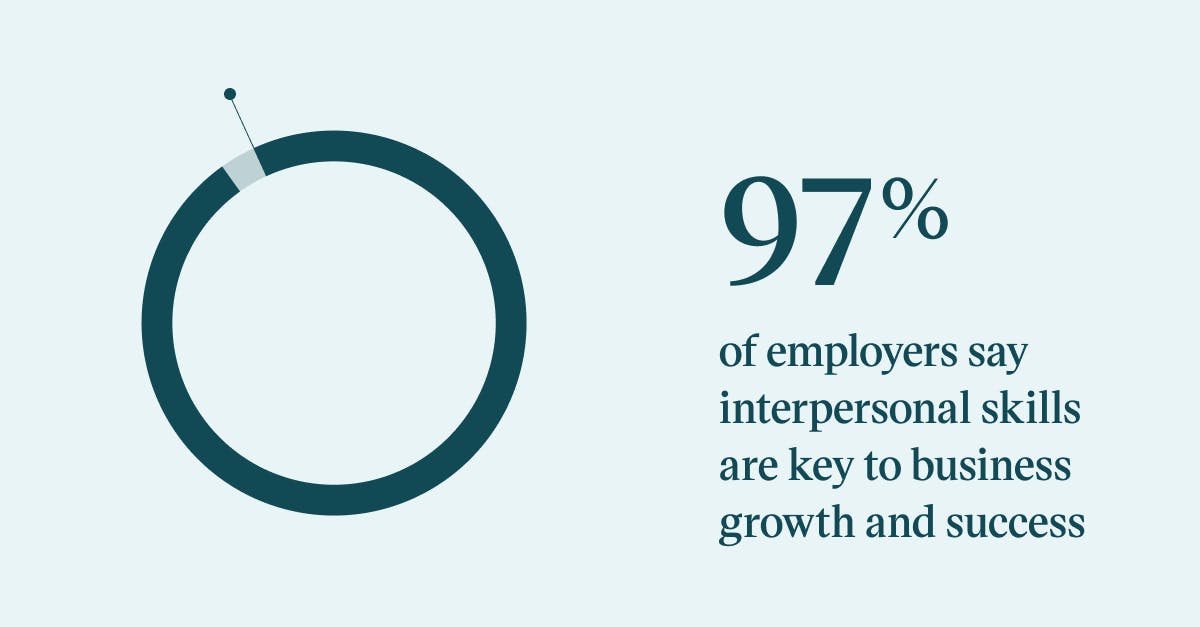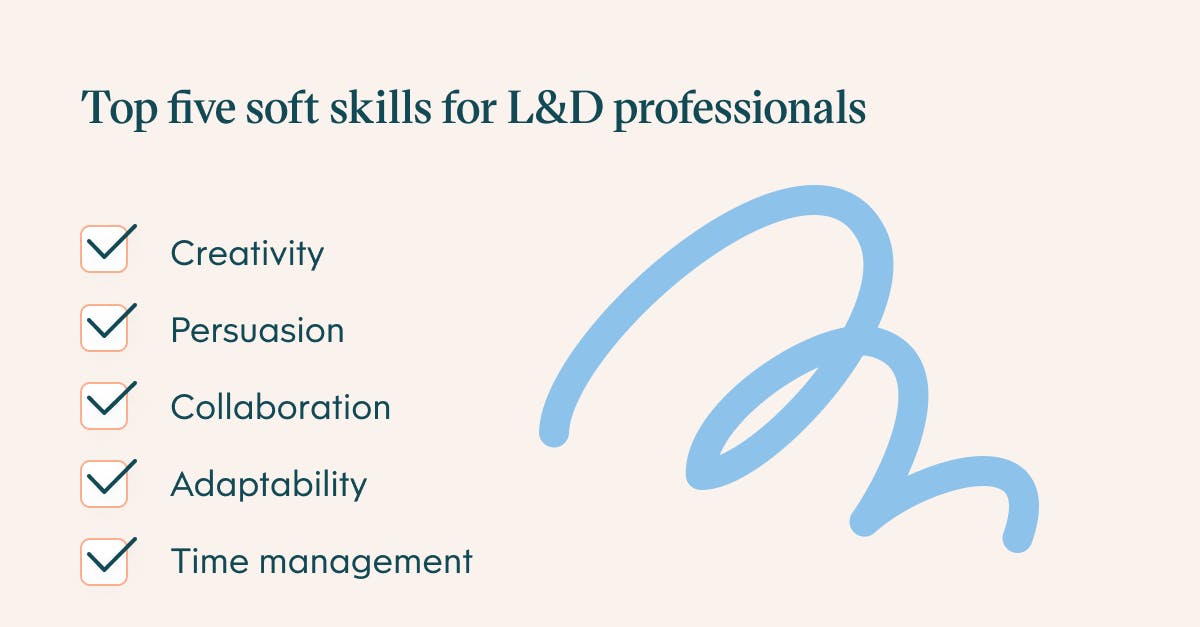
Why interpersonal skills will be vital in the future of work

From a friendly hello in the morning to astute conflict resolution abilities, interpersonal skills have always been valuable in the workplace. It is these skills, such as empathy, collaboration, and adaptability, that keep a workplace running smoothly and bring a distinctly human touch to any organisation. However, in recent years, demand for interpersonal skills has skyrocketed. Now, many predict these skills could define the future of work.

With that in mind, we’ll take a closer look at the interpersonal skills needed for the future of work. We’ll start by defining interpersonal skills, before tracking the rise of soft skills and detailing which interpersonal skills are most in-demand.
This article will be the first in a series of four, stemming from our recent deep dive into the foundational skills you’ll need in 2022. Over the coming weeks, we’ll detail the interpersonal, leadership, digital, and cognitive skills you’ll need to get ahead in 2022 and beyond. Be sure to check back regularly to stay up to date with the skills that may come to define the future of work.
What are interpersonal skills?
Interpersonal skills (sometimes known as soft skills) are the ability to communicate and build relationships with others. Examples of interpersonal skills include communication, collaboration, conflict resolution, leadership, adaptability, patience, and empathy.
According to Skills You Need, “interpersonal skills are the skills we use every day when we communicate and interact with other people, both individually and in groups. They include a wide range of skills, but particularly communication skills such as listening and effective speaking. They also include the ability to control and manage your emotions.”
Interpersonal skills often contrast with hard skills, which are the technical knowledge needed to do something. Examples of hard skills include speaking another language, SEO expertise, or Salesforce knowledge. Indeed provides a handy contrast between soft skills and hard skills, explaining, “hard skills are related to specific technical knowledge and training while soft skills are personality traits such as leadership, communication or time management.”
In recent years, demand for soft skills has risen sharply. One key reason for this is that interpersonal skills are evergreen, whereas hard skills can become outdated quickly. As LinkedIn explains, “the shelf life of technical skills is relatively short — less than 5 years — while strong leadership, creativity, and communication skills are always in demand.”

Accordingly, strong interpersonal skills are now vital to stand out to employers and get ahead in the workplace.
The rise of soft skills
Recently, there has been a paradigm shift between soft skills and hard skills. In the past, hard skills were coveted. While this is still true for many specialist skills, trends suggest the era of hard skills is coming to an end. Now, soft, interpersonal skills such as empathy, collaboration, conflict resolution, and fostering inclusiveness are in high demand. In the coming years, demand for these skills is likely to continue rising.
Of course, some hard skills will always be necessary to perform certain tasks. However, hard skills alone may no longer be enough to excel at work, as has been the case in the past. Rather, a healthy mix of hard and soft skills is now essential. As IBM puts it, “a shift is occurring; executives’ views regarding the priority of critical skills have taken a turn from digital and technical to behavioural.”
Already, 93% of employers believe soft skills are “very important” or “essential”, while 97% say interpersonal skills are key to business growth and success. Further, 91% of organisations say they want more soft skills.

Similarly, a recent study of Fortune 500 CEOs found that 75% of long term job success relies on people skills (soft skills), compared to just 25% that depends on technical skills (hard skills). Many executives now prioritise soft behavioural skills over hard technical skills, recognising these skills will be crucial to gain a competitive edge in the future.
The rise of soft skills should come as no surprise, as 89% of recruiters say when a hire doesn’t work out, it usually comes down to a lack of soft skills. On the other hand, McKinsey finds that people with strong interpersonal skills are 14% more likely to earn a top-quintile income. Therefore, developing strong interpersonal skills is vital to workplace success.
What’s more, a recent analysis of more than 82 million job ads found that the top five soft skills are requested 3.8x more than the top five hard skills, while seven of the ten most requested skills are soft skills. 64% of job postings ask for soft skills, including 36% that want at least three soft skills.
Despite this, there is plenty of room for growth as companies define their processes and identify which soft skills are most important to their business. For example, although 97% of employers say soft skills are essential, only 37% say their entry-level employees possess the necessary soft skills.
Additionally, only 51% of employees believe their company understands the soft skills they want, while just 31% of employers provide soft skills development training to their employees. Given this, there is still significant room for expansion and refinement, suggesting that interpersonal skills will only become more influential in the future.
What interpersonal skills are most in-demand?
Now that we understand the rise and significance of soft skills, it’s time to answer the question on everyone’s lips: what interpersonal skills are most in-demand? What skills should I focus on to stay relevant or get ahead in the future?
LinkedIn’s 2021 Workplace Learning Report identified the highest priority skills for L&D professionals based on the percentage of surveyed professionals who are developing these skills. Unsurprisingly, soft skills came out on top, with leadership management (57%), creative problem solving and design thinking (42%), and communication (40%) leading the way.
LinkedIn’s report also took this a step further, identifying the top five soft skills for L&D professionals. These are:

Similarly, a survey of more than 30,000 recruiters found the most in-demand interpersonal skills are dependability, problem-solving, teamwork, collaboration, and flexibility.
Finally, a report by Wiley Education Services identified the interpersonal skills that employers have the most trouble finding, including critical thinking (36%), communication (36%), and creativity (34%). Developing these skills is likely to give you an excellent head start in the future of work.
Need some help developing your team’s interpersonal skills? Go1 has you covered. Check out our playlist on Why Interpersonal Skills are More Important Than Ever to access leading courses on empathy, collaboration, leadership, inclusion, and much more.
Or, you can book a demo today to find out how Go1 can support your team’s learning needs.




